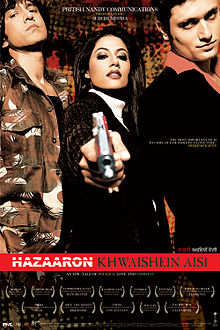Hazaaron Khwaishein Aisi
| Hazaaron Khwaishein Aisi | |
|---|---|

Poster
|
|
| Directed by | Sudhir Mishra |
| Produced by | Rangita Pritish Nandy |
| Written by |
Ruchi Narain Sudhir Mishra Shiv Kumar Subramaniam Sanjay Chauhan (Hindi dialogues) |
| Starring |
Kay Kay Menon Chitrangada Singh Shiney Ahuja Saurabh Shukla Ram Kapoor |
| Music by | Shantanu Moitra |
| Cinematography | Ravi K. Chandran |
| Edited by | Catherine D'Hoir |
|
Release date
|
|
| Country | India |
| Language | Hindi |
Hazaaron Khwaishein Aisi is an Indian film made by director Sudhir Mishra in 2003 but released in 2005. Set against the backdrop of the Indian Emergency, the movie tells the story of three young people in the 1970s, when India was undergoing massive social and political changes. The title is taken from a poem by Urdu poet Mirza Ghalib.
It went to 12 film festivals in 6 months including Turkey, Estonia, River to River (Florence), Berlin, Edinburgh, Washington, Goa, Bite The Mango (Bradford), Commonwealth (Manchester), India (Los Angeles), Dallas, and Pacific Rim (California).
The film opens at Hindu College, Delhi with the story of three students, Siddharth Tyabji (Kay Kay Menon), Geeta Rao (Chitrangada Singh) and Vikram Malhotra (Shiney Ahuja).
Siddharth is a driven revolutionary who dreams of bringing a revolution in the state of Bihar that will end the caste-based discrimination there, bring social justice, and improve society. Geeta is a London-returned, South Indian in love with the firebrand Siddharth. She has led a very sheltered life and is yet to explore the terrain of the Indian socio-political landscape. While she finds Siddharth's Naxalite rhetoric attractive, she is not sure if she can whole-heartedly subscribe to it. Every time they come to a choice, Siddharth chooses his ideology over his love for her thus breaking her heart time and again. Vikram is a middle-class boy who dreams of making it big, whatever the cost. He is particularly afflicted by his father's Gandhian ideas, but irritated and frustrated at the same time, seeing his father's way of life as ineffective in bringing about change.
...
Wikipedia
